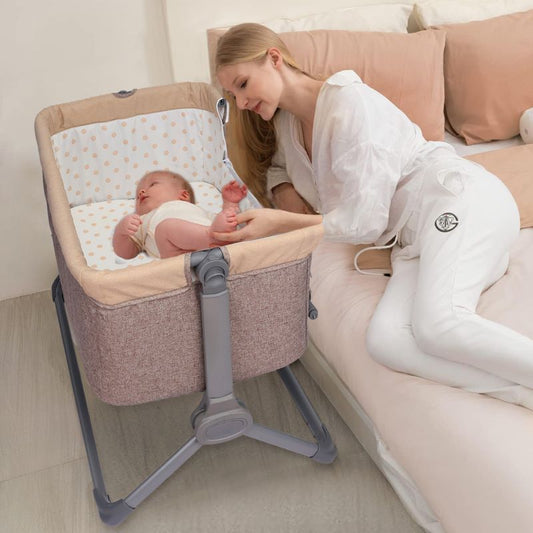Hernia in Your Newborn: Don't Panic, Here's How to Spot & Treat It

Have you seen a bump on your child's stomach? People often worry about hernias in Indian babies. One of the first things that new parents look into is their baby's belly button healing.
Carefully watching the umbilical cord stump dry out and stay free of infection for a week, it finally comes off, revealing the navel. From time to time, that belly button can be a worry when it feels hard or looks bigger than it is.
A piece of tissue or an organ can emerge through a weakened spot in the surrounding muscle or connective tissue, forming a hernia. Babies may experience two main types of hernias. The umbilical hernia can be caused by a round bump next to your baby's belly button. A groin bump can cause an inguinal hernia. It occurs when fluid or intestines move through the inguinal canal.
If you notice a discoloured bump around your baby's belly button, quickly consult a doctor. Go through this Instagram Reel by Dr. Pavan Mandaviya for more details. Also, you must follow this blog post to learn more about hernia in babies. So, please keep reading and exploring.
Understanding Hernias in Babies
1. Causes
Numerous things can cause babies to develop hernias. Weak abdominal wall muscles, common in newborns, increase the risk of herniation. Hernias can also happen because of the stress on the abdominal muscles during delivery.
Genetic predispositions and these other things make it more likely for babies to get hernias. Knowing these reasons can help parents spot and treat hernias correctly.
2. Types of Hernias
Little ones have a bulge near their belly button because their abdominal muscles don't close around the umbilical cord. Hernias in the navel are what this is called. People often get these kinds of hernias, and by the time they have two, most kids are no longer a child. Inguinal hernias happen when a part of the intestine’s hits through the groin.
Because of the risk of complications and the need for proper healing, these hernias may need surgery instead of umbilical ones.
3. Symptoms
Babies' hernia often has a noticeable bump near their belly button. This bulge may get bigger when they cry or strain. Parents may also see problems or crying while changing diapers, especially if they put pressure on the area.
Usually, these signs mean that your baby has a hernia. So, parents should take babies to the doctor to learn how to care for them.
4. When to See a Doctor
Quickly consult a Pediatrician if the hernia is big, hurting, or worsening over time. As soon as possible, a medical professional should look at any large or painful hernias, especially ones that do not go away alone. Doctors can avoid problems and ensure the baby is cared for by acting swiftly.
Get your baby to the doctor right away if a hernia stays open, gets bigger, or causes pain. Hernias that are not treated can get worse, like strangulation, where the protruding tissue gets stuck and stops blood flow, damaging the tissue. This potentially serious problem needs to be fixed right away by a doctor.
Also Read: How to Take Better Care of Your Newborn Baby as First-Time Parents?
Treatment Options for Hernias
1. Non-surgical Management
Observation is a non-surgical baby hernia treatment in India with small umbilical hernias. The observation involves watching the hernia as it heals as the child grows. Parents should monitor the hernia's size and symptoms during this time.
Surgical intervention may be considered if the hernia worsens. Many small umbilical hernias in infants resolve without surgery, so observation is often the first treatment.
2. Surgery
Babies typically undergo surgical treatment of inguinal or strangulated hernias. This small operation involves repositioning of the protruding tissue. It strengthens the abdominal wall to prevent recurrence.
To ensure the baby's good health and prevent complications, surgical repair of the inguinal hernia in baby is necessary. The operation is common, usually performed under general anaesthesia. It can pose few risks, but it overall has a high success rate in fixing hernias.
Caring for Your Baby with a Hernia
1. Soothing Techniques
Gentle, soothing techniques can help a baby with a hernia feel better. A warm compress or light massage might help if the baby is hurting or fussy. To ensure they are safe and right for your baby's condition, you should talk to a paediatrician before trying home remedies. For short-term relief, massage the muscles around the hernia.
Also, a warm compress can help ease any pain or swelling in the area. Using these gentle methods when you care for your baby will help them feel better while you take care of their hernia. Put your baby's health first, and talk to medical professionals for personalized advice and help.
2. Activity Restrictions
Mothers whose babies have hernias should follow what their doctors tell them about how much they can do. They should be careful not to make babies with hernias worse by restricting their physical activities. If lifting heavy things or working out hard hurts your abs too much, your doctor may tell you to stop doing those things.
Additionally, parents should ensure that their kid does not do anything that puts extra stress on the herniated area. This includes crying for a long time or having trouble going to the bathroom. Doing what your child's doctor says and being careful when you move and touch them can help their hernia heal faster. Talk to the doctor whenever you need help with your baby's health.
Also Read: Baby Hygiene Tips For Cold And Flu Season
Preventing Hernias (if possible)
1. Proper Lifting Techniques
You must lift your baby in the right way to avoid getting hernias. Always hold your baby's head and neck when you pick them up. This will equally distribute your weight and protect your delicate abdominal muscles. They are more likely to get a herniation if you lift them by their legs or arms instead of their stomach.
Take a soft and encouraging approach to ensure they are safe. Parents may aid in hernia prevention and healthy development in their children by correct lifting techniques.
It is true that hernias are less common when parents use safe lifting techniques. However, they can still develop for reasons like heredity or complications during delivery. Thus, to detect hernias in infants early and treat them appropriately, it is essential to have regular checkups with a paediatrician.
2. Avoiding Constipation
Healthy digestion helps babies avoid constipation, which can worsen hernias. Breastfeeding provides essential nutrients and makes it easier to poop because it is digestible. Breast milk antibodies can prevent constipation-causing infections. Feeding them often moisturizes their stools and relieves constipation.
Ginger and fennel-infused gripe water is given to babies with stomach issues. It reduces constipation by relieving gas and encouraging bowel movements. To ensure gripe water is safe for your baby, consult a paediatrician. Parents must follow these feeding tips to help their kids digest food. They can even avoid constipation-related hernias with these recommendations.
The Importance of Early Diagnosis and Treatment of Hernia
1. Problem Avoidance
Early detection of hernias by doctors allows them to be treated quickly. By ignoring treatment, hernias can get worse. They can cover the organ and cut off blood flow. This is called incarceration or even strangulation, which means that blood flow is completely cut off. In these types of life-threatening situations, surgery is often needed right away.
2. The Standard of Living
By intervening early on, you can guarantee that your baby will have a typical developmental trajectory. Hernias are real and can cause pain, restrict movement, and cause discomfort. You can improve your baby's quality of life by getting medical help early.
3. Minimally Invasive Procedures
When treated early, ankle hernias typically do not require surgery or involve very few incisions. Typically, these options perform better when implemented early on. You run the risk of requiring more extensive surgery if you put off treatment.
4. Relaxed State
Knowing that a medical professional is watching their child's health and acting swiftly soothe parents. You can stay informed and take necessary action with regular checkups and early diagnoses.
If you notice any unusual symptoms, like a lump, pain, or changes in your infant's behaviour, you should take it seriously. If you suspect your baby may have a hernia, you should contact a Pediatrician without delay. Seek the advice of professionals to ensure your baby receives the care they require.
The best way to treat hernias in babies is to find them and clean them up right away. Telling parents that hernias can be fixed and that most babies get better with the right medical care is very important.
Giving the child timely medical care can stop problems before they happen. So, you should immediately take your baby to the doctor; it will help with your baby's good health.
Awareness Assists Parents Manage Common Health Issues
It is quite scary if you find an umbilical hernia in baby, but do not panic. Knowing hernias and how they occur helps parents handle this common issue. Early detection requires awareness of symptoms like belly button or groin bulges. Seeking medical attention quickly ensures proper treatment, whether it is an observation, conservative management, or scenario of a surgery.
While surgery may seem scary, infant hernia repair procedures are usually minor and successful. When treated properly, most babies recover from hernias without long-term complications. Preventing newborn hernias with proper lifting and digestion can help too.
Key Takeaways
Parenthood is full of uncertainty, but being prepared for hernias can reduce anxiety. By staying informed, proactive, and seeking support from healthcare professionals, parents can confidently diagnose and treat newborn hernias.
R for Rabbit is one of the best places to buy baby products because newborns need many high-quality things. They put safety and dependability first by advising parents on their babies' health and well-being. This gives parents peace of mind. You can trust R for Rabbit to care for your baby's needs with their higher quality baby products.












